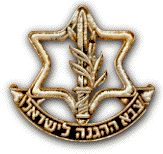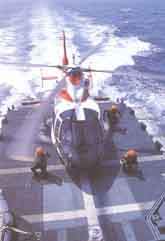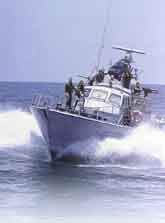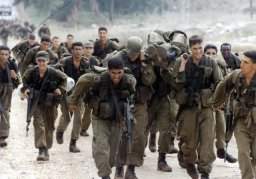Israel Defense Forces
Prayer for the Well-Being of the
|
The IDF, founded in 1948, ranks among the most battle-trained armed forces in the world, having had to defend the country in five major wars. Currently, the IDF's security objectives are  to defend the existence, territorial integrity and sovereignty of the State of Israel, deter all enemies and curb all forms of terrorism which threaten daily life. Its main tasks include spearheading the war against terrorism, both inside Israel and across its borders; and maintaining a deterrent capability to prevent the outbreak of hostilities.
to defend the existence, territorial integrity and sovereignty of the State of Israel, deter all enemies and curb all forms of terrorism which threaten daily life. Its main tasks include spearheading the war against terrorism, both inside Israel and across its borders; and maintaining a deterrent capability to prevent the outbreak of hostilities.
 to defend the existence, territorial integrity and sovereignty of the State of Israel, deter all enemies and curb all forms of terrorism which threaten daily life. Its main tasks include spearheading the war against terrorism, both inside Israel and across its borders; and maintaining a deterrent capability to prevent the outbreak of hostilities.
to defend the existence, territorial integrity and sovereignty of the State of Israel, deter all enemies and curb all forms of terrorism which threaten daily life. Its main tasks include spearheading the war against terrorism, both inside Israel and across its borders; and maintaining a deterrent capability to prevent the outbreak of hostilities.
To ensure its success, the IDF's doctrine at the strategic level is defensive, while its tactics are offensive. Given the country's lack of territorial depth, the IDF must take initiative when deemed necessary and, if attacked, to quickly transfer the battleground to the enemy's land. Though it has always been outnumbered by its enemies, the IDF maintains a qualitative advantage by deploying advanced weapons systems, many of which are developed and manufactured in Israel for its specific needs. The IDF's main resource, however, is the high caliber of its soldiers.
 In preparing for defense, the IDF deploys a small standing army (made up of conscripts and career personnel) with early warning capability, and a regular air force and navy. The majority of its forces are reservists, who are called up regularly for training and service and who, in time of war or crisis, are quickly mobilized into their units from all parts of the country.
In preparing for defense, the IDF deploys a small standing army (made up of conscripts and career personnel) with early warning capability, and a regular air force and navy. The majority of its forces are reservists, who are called up regularly for training and service and who, in time of war or crisis, are quickly mobilized into their units from all parts of the country.
The IDF's three service branches (ground forces, air force and navy) function under a unified command, headed by the chief-of-staff, with the rank of lieutenant-general, who is responsible to the Minister of Defense. The chief-of staff is appointed by the government, on recommendation of the prime minister and minister of defense, for a three-year term, which is usually extended for an additional year.
 Except when combat duty is involved, men and women soldiers of all ranks serve side by side as technicians, communications and intelligence specialists, combat instructors, cartographers, administrative and ordnance personnel, computer operators, doctors, lawyers and the like. The IDF is responsive to the cultural and social needs of its soldiers, providing recreational and educational activities, as well as personal support services. Recruits with incomplete educational backgrounds are given opportunities to upgrade their level of education, and career officers are encouraged to study at the IDF's expense during their service. The integration of new immigrant soldiers is facilitated through special Hebrew language instruction and other programs. Active in nation-building enterprises since its inception, the IDF also provides remedial and supplementary education to civilian populations and contributes to the absorption of newcomers among the population at large. In times of national crisis or emergency, the IDF responds immediately with appropriate action and assigns trained personnel to fill essential jobs or carry out special tasks.
Except when combat duty is involved, men and women soldiers of all ranks serve side by side as technicians, communications and intelligence specialists, combat instructors, cartographers, administrative and ordnance personnel, computer operators, doctors, lawyers and the like. The IDF is responsive to the cultural and social needs of its soldiers, providing recreational and educational activities, as well as personal support services. Recruits with incomplete educational backgrounds are given opportunities to upgrade their level of education, and career officers are encouraged to study at the IDF's expense during their service. The integration of new immigrant soldiers is facilitated through special Hebrew language instruction and other programs. Active in nation-building enterprises since its inception, the IDF also provides remedial and supplementary education to civilian populations and contributes to the absorption of newcomers among the population at large. In times of national crisis or emergency, the IDF responds immediately with appropriate action and assigns trained personnel to fill essential jobs or carry out special tasks.Society and Service
Service in the Israel Defense Forces (IDF) is a measure of involvement in the country's life. Most men and single women are inducted into the IDF at age 18, women for two years and men for three, followed by service in the reserves, men up to age 51 and single women to age 24. Out of respect for their community's religious commitments, Orthodox women may be exempted, although many choose to perform 1-2 years national service in the civilian sector. Most ultra-Orthodox men are granted deferments while pursuing Torah studies, and those who serve in the IDF mainly fulfill religious functions.
Out of respect for their community's religious commitments, Orthodox women may be exempted, although many choose to perform 1-2 years national service in the civilian sector. Most ultra-Orthodox men are granted deferments while pursuing Torah studies, and those who serve in the IDF mainly fulfill religious functions.
In essence, the society and army are one, as a broad spectrum of the population serves periodically over many years, with those in and out of uniform virtually interchangeable. Since soldiers often hold ranks not necessarily corresponding with their status in civilian life, the IDF has become a highly effective equalizer in the society and contributes greatly to integrating individuals from all walks of life. The IDF also helps new immigrants during their period of military service to acclimate to Israeli life in a framework wherein each person is undergoing the same process.
Over the years, the IDF has assumed a variety of national-social functions for the society at large; providing special services for new immigrants; upgrading educational levels of adults who were denied basic education in their countries of origin; supplying teachers to development towns; assisting in disadvantaged areas and responding to emergency situations in the civilian sector.
The Ethical Code of the IDF
 The IDF draws its values and basic principles from three traditions:
The IDF draws its values and basic principles from three traditions:
a. The tradition of the Jewish People throughout its history.
b. The tradition of the State of Israel, its democratic principles, laws and institutions.
c. The tradition of the IDF and its military heritage as the Israel Defense Forces.
The obligation to fulfill the mission and ensure military victory will be the compass guiding any effort to balance these values and basic principles of The Spirit of the IDF. The striving for proper balance according to this compass will make it possible to preserve the IDF as a body of high quality, imbued with values, and which fulfills its duties and missions appropriately.
Perseverance in Mission
The IDF serviceman will fight and conduct himself with courage in the face of all dangers and obstacles; he will persevere in his mission courageously, resolutely and thoughtfully even to the point of endangering his own life.
The perseverance of IDF servicemen in their mission is their capability and readiness to fight courageously in the face of danger and in most challenging situations; to strive unremittingly to achieve the military goal effectively, with full regard for the particular circumstances, notwithstanding any difficulty, stress or adversity or even mortal danger. They will do so with proper judgment and with due regard for risks.
Comradeship
The IDF serviceman will always go to the aid of his comrades when they need his help or depend on him, despite any danger or difficulty, even to the point of risking his life.
The fellowship of IDF servicemen is their bond as comrades in arms. It is their unwavering commitment to each other, their readiness to extend appropriate assistance, to go to the aid of a comrade, and even risk their lives on his behalf. In all their actions they will uphold and strengthen the solidarity of their unit in full cooperation with other units, and in support of the overall goals of the IDF.
Discipline
The IDF serviceman will execute completely and successfully all that is required of him according to the letter and spirit of his orders and within the framework of the law.
The discipline of IDF servicemen is their readiness to act to the full extent of their abilities, to carry out what is demanded of them completely, according to their understanding of the letter of the orders they have received, and successfully, according to the spirit of their orders. It is their readiness to obey orders amidst a constant striving to execute them with understanding and dedication. They will take care to issue only legal orders, and disavow manifestly illegal orders.
Human Life
The IDF serviceman will, above all, preserve human life, in the recognition of its supreme value and will place himself or others at risk solely to the extent required to carry out his mission.
The sanctity of life in the eyes of the IDF servicemen will find expression in all of their actions, in deliberate and meticulous planning, in safe and intelligent training and in proper execution of their mission. In evaluating the risk to self and others, they will use the appropriate standards and will exercise constant care to limit injury to life to the extent required to accomplish the mission.
Loyalty
The IDF serviceman will act with complete dedication in the defense of the State of Israel and its citizens, according to IDF orders, within the framework of the laws of the State and democratic principles.
The loyalty of IDF servicemen is their dedication, in all actions, to their homeland, the State of Israel, its citizens and armed forces, and their constant readiness to fight and devote all their power, even at the risk of their own lives, in the defense of the sovereign State of Israel and the lives and the safety of its inhabitants, according to the values and orders of the IDF, while following the laws and the democratic principles of the State.
Personal Example
 The IDF serviceman will comport himself as is required of him and will, himself, act as he demands of others, thoughtfully and dedicatedly, aware of his ability and responsibility to serve as a role model to those around him.
The IDF serviceman will comport himself as is required of him and will, himself, act as he demands of others, thoughtfully and dedicatedly, aware of his ability and responsibility to serve as a role model to those around him.
The personal example of the IDF servicemen is their acting as is demanded of them and as they themselves demand of others, their clear and convincing readiness to serve as an example to those around them, in their actions and comportment, to create, uphold and foster mutual identification and joint responsibility in properly carrying out their tasks and accomplishing their missions in all areas of military activity.
Professionalism
The IDF serviceman will aspire to be familiar with and understand the body of knowledge pertaining to his military position and will master every skill necessary for carrying out his duties.
The professionalism of IDF servicemen is their ability to correctly perform their military duties through striving to constantly excel in and improve their unit's and their individual achievements. They will do so by broadening their knowledge, and increasing proficiency, based upon the lessons of experience and study of the heritage and by expanding and deepening their understanding of the body of military knowledge.
Purity of Arms
The IDF serviceman will use force of arms only for the purpose of subduing the enemy to the necessary extent and will limit his use of force so as to prevent unnecessary harm to human life and limb, dignity and property.
The IDF servicemen's purity of arms is their self�control in use of armed force. They will use their arms only for the purpose of achieving their mission, without inflicting unnecessary injury to human life or limb; dignity or property, of both soldiers and civilians, with special consideration for the defenseless, whether in wartime, or during routine security operations, or in the absence of combat, or times of peace.
Representativeness
The IDF serviceman will constantly see himself as a representative and an emissary of the IDF. As such he will act solely on the basis of the authority he has been given and orders he has been issued.
The representativeness of IDF servicemen is their consciousness, expressed in all their actions, that the armed force placed in their hands and the power to use it are given to them only as members of the IDF and its authorized representatives, duly executing their orders in accordance with the laws of the State of Israel and is subject to its Government.
Responsibility
The IDF serviceman will see himself as an active participant in the defense of his country and its citizens. He will carry out his duties decisively, resolutely and with vigor, within the limits of his authority.
The responsibility of IDF servicemen is their active partnership and their readiness to use their utmost abilities in the defense of the State, its sovereignty, and the lives and safety of its citizens, within the framework of authority granted them by the IDF. They will carry out their duties fully, diligently, and with determination, commitment and initiative, in clear awareness that they are answerable for any consequences.
Trustworthiness
The IDF serviceman will strive in all his actions to fulfill his duties correctly and at the highest professional level, from exacting and thorough preparation to true, honest, complete and precise reporting.
The trustworthiness of IDF servicemen is their reliability in fully carrying out their charge, using their military skills, with the sincere belief and conviction that they are acting professionally. They are ready at all times to present things as they are, in planning, executing and reporting truthfully, completely, courageously and honestly.

No comments:
Post a Comment